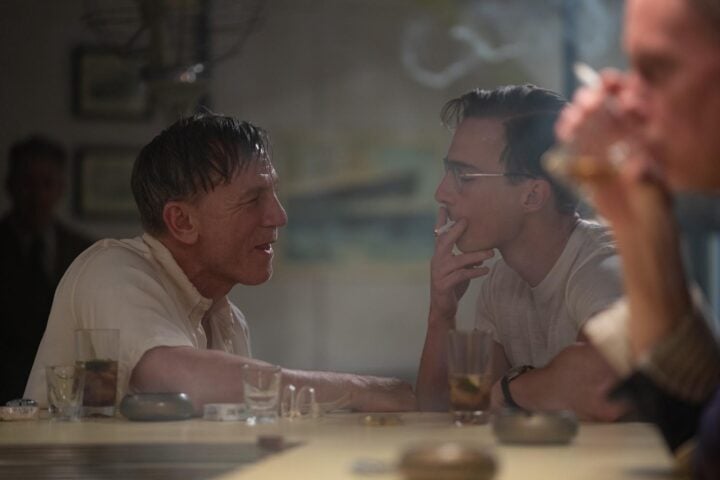“Are we talking about tennis?” asks Patrick Zweig (Josh O’Connor) in a mid-aughts flashback as chugging, four-on-the-floor beats kick in to accompany an argument between him and his sure-to-turn-pro girlfriend, Tashi Duncan (Zendaya). It’s one of several instances in director Luca Guadagnino’s sexy, swaggering sports drama Challengers where the characters make subtext into text. “We’re always talking about tennis,” she responds, but in Justin Kuritzkes’s screenplay, tennis isn’t just tennis—it’s sex, it’s power, it’s self-determination, or, as Tashi herself puts it at one point, “it’s a relationship.” What do we talk about when we talk about tennis? In Challengers at least, it’s absolutely everything else.
Challengers frames its drama against a 2019 ATP event where the sport’s biggest star, 33-year-old Art Donaldson (Mike Faist), is competing to regain some confidence after a professional rough patch on his way to a Grand Slam. Spurred on by Tashi, his wife and coach, the opportunity to cream some amateur players and get his groove back is jeopardized by Patrick, a burned-out but still formidable player who carries with him the baggage of his and Art’s younger years spent as bunkmates competing for Tashi’s affections. As Art and Patrick go toe to toe on the court, with Tashi the former rising tennis prodigy observing from the stands, Guadagnino’s latest leapfrogs back and forth from the past to the present and back again to examine the broken friendship and complex romantic entanglements at its center.
Though shot in Boston, Challengers might as well be set in Anytown, U.S.A., with Guadagnino keeping our featureless national topography of sports clubs and casual dining franchises at a remove, as only an outsider can. Adding to this sense of alienation, the characters in Challengers may “have it all,” but this is the most critical the director has ever been of his well-heeled protagonists’ social mobility. Tashi and Art are a highly successful duo whose status feels more like a prison; the two are vibrant on the court but otherwise exist entombed in the sterile luxury of the lifeless hotels they inhabit, which are a far cry from the romantic palazzos and isolated villas of Call Me By Your Name or A Bigger Splash. Affluence porn this is not.
But there are indulgent aesthetic pleasures to be had here, from the sporty-chic outfits for the handsome cast to the film’s sinuous imagery. Sayombhu Mukdeeprom’s camera drinks in every bit of the main characters’ clothed and unclothed bodies. Guadagnino has never shied away from sensuality and an appreciation of the human form is integral to his cinema on a molecular level. Though Challengers isn’t quite the erotic romp teased by the trailers, its frankness and fluidity are still hot stuff in the increasingly sex-starved landscape that is American cinema.

Challengers is also an intoxicating showcase for the beauty and excitement of bodies in motion. The match that’s threaded throughout the film brings it to a close in a bravura, tensely euphoric sequence with dynamic slow-mo, swooping crane shots, handheld camera work, and some surprising POV segments that capture every primal groan and orgiastic thwack of Patrick and Art’s final showdown as they push their imposing physiques to the limit.
That passage ends in the film’s well-earned money shot, but all the delicious tension leading up to it is something to be savored. Faist and O’Connor are specimens, and Challengers makes no bones about it, with an objectifying gaze that accentuates Tashi’s characterization as the ultimate player in this game of desire. While Patrick and Art have their eyes glued to Tashi, she’s always looking past their amorous charms—her smart Persol frames trained on something more substantial and elusive than a three-way, lasting marriage, or a life-changing brand deal.
Through it all, Zendaya plays Tashi with flinty aloofness. Faist and O’Connor are a perfectly matched pair, with the boyish actors going from floppy-haired youths to battle-worn thirtysomethings with surprising ease. The U.K.-born O’Connor threatens to outshine Faist with his purring American rich-kid affect, but Faist is more than up to the challenge as the waspy good-guy ballast to his partner’s magnetic wildcard. Like seeing a well-balanced team dominate in triples, the film is a true three-hander, with everyone performing at the top of their game.
Atticus Ross and Trent Reznor’s score feels like a sweaty, thumping, barn-burning event in and of itself. The house-inflected tracks throb and sidewind with excitement and menace—adding a propulsive, glistening intensity to bouts of athleticism on the tennis court or verbal sparring off of it. The virulently danceable soundscape becomes integral to Challengers’s central idea—that the rhythms of a tennis match can be seen as an analog for life and love.
There’s a clunkiness to the metaphorical thrust of Kuritzkes’s script, what with the characters verbally signposting that discussions about tennis are really about something more, but Guadagnino turns this into a strength by leaning in such moments: When confrontations start, the electronic bassline kicks up and viewers might find themselves fighting to hear the dialogue over the jackhammering beats, making the film’s analogies bracingly literal. There’s an undeniably waggish, emotionally direct meta-cinematic flair to these sequences that helps deliver the film’s thesis with the exhilarating force of an overhead smash.
Since 2001, we've brought you uncompromising, candid takes on the world of film, music, television, video games, theater, and more. Independently owned and operated publications like Slant have been hit hard in recent years, but we’re committed to keeping our content free and accessible—meaning no paywalls or fees.
If you like what we do, please consider subscribing to our Patreon or making a donation.






There are no words to describe Rocco T Thompson’s masterful words. Superb writing. Congrats on a great review.